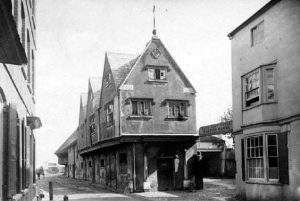Written by John Bishop
There was a clear expectation that we would hear an account of life in Newbury from 1700 to 1800. Penelope has just published her excellent book “Georgian Newbury”, which covers everything about life in Newbury, schools, shops, the corporation, doctors and disease, crime and punishment, politics and protest, and the importance of church and chapel. But we were privileged to much more. Penelope chose four characters, all of whom, regardless of wealth or upbringing, made a substantial difference to the lives of their fellow men.
John Collet was a London born doctor of high esteem. He married in Speen Church and had four children, none of whom survived to adulthood. He chose to live in the cheaper end of town at the bottom of Cheap Street and was well respected, treating rich and poor alike. Most notable was his concern for abandoned babies from the Foundling Hospital in Bloomsbury, of which there were many. The situation was dire in London, and he personally organised wet and dry foster mothers to go to collect these tiny lives in an open cart. He paid the foster mothers 2/6p a week, and one time there were 200 such children under his medical and pastoral care.

Jane Sarson was one of those mothers. She was married to Thomas, a patten maker, which is someone who made clogs, and so was poor. She had three children, none of whom survived. She was one of the women who left Newbury in a waggon for London on a Sunday, collecting her child and returning on the Tuesday. Normally the children stayed until they were 5 years old but John Collet arranged that her first child William Stanley would stay to be apprenticed to Thomas, and so learn to make clogs.
Joseph Toomer came to Newbury in 1730. He was the son of a successful business man and an artist trained at the Royal academy, so painted a lot of pictures of Newbury. He founded the iron mongers ‘Toomers’, which only recently ceased to trade. He had 8 children and was chief magistrate in Newbury and three times mayor. He was a kind and generous man who organised a massive feast to celebrate the defeat of Napoleon. He petitioned parliament against slavery, getting 330 signatories, and animal cruelty, particularly badger baiting. He was involved in a wager about shearing a sheep, spinning the wool and producing a suit, and feasting on the unfortunate animal all in one day.
Finally, we heard of Elisabeth Montague who married at 22, though her husband was 52 and very rich. She had one child who died at 15 months old. She created the Blue Stocking Group, a group of writers, moralists and actors with a great awareness of their social responsibility. She started a Sunday school, subsidised bread in Newbury, campaigned with Wilberforce against slavery, and for the chimney sweeps and Yorkshire miners. She wrote extensively: satires, essays, political commentary, and letters on health, domestics, travel, social culture, moral philosophy, history and divinity. She died in 1800 aged 82, leaving her fortune to her adopted son Mathew.
These four people had a great sense of their responsibility for their fellow men, regardless of their circumstances in life. Out of strong Christian commitment they demonstrated a sense that they were accountable to God for the way they lived their lives for the good of the society they were part of. Winston Churchill is reputed to have said “the one thing we learn from history is that we don’t learn from history”. Perhaps it is time we tried to learn from history for the sake of our world and future generations.

